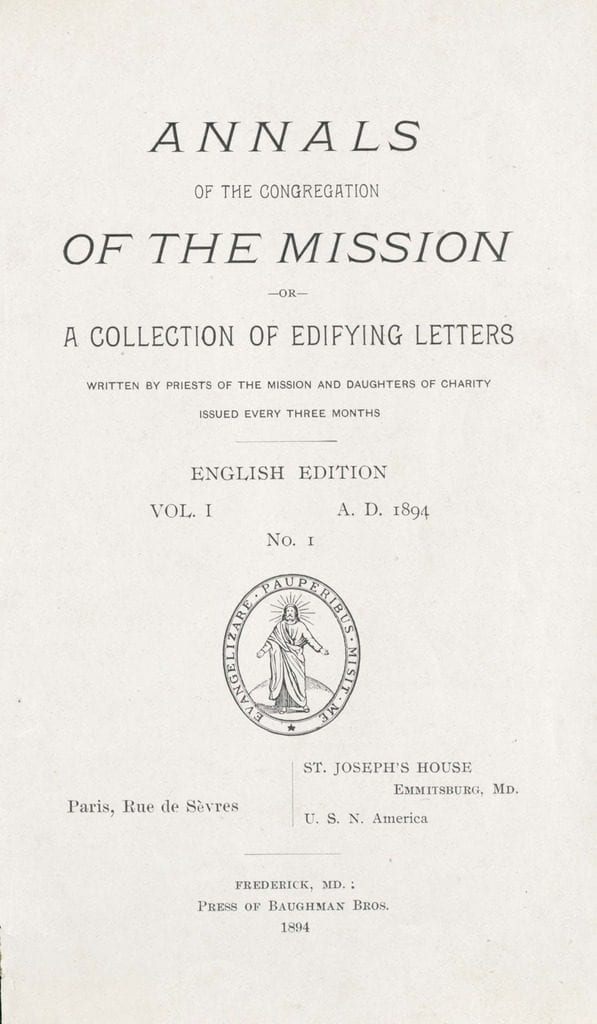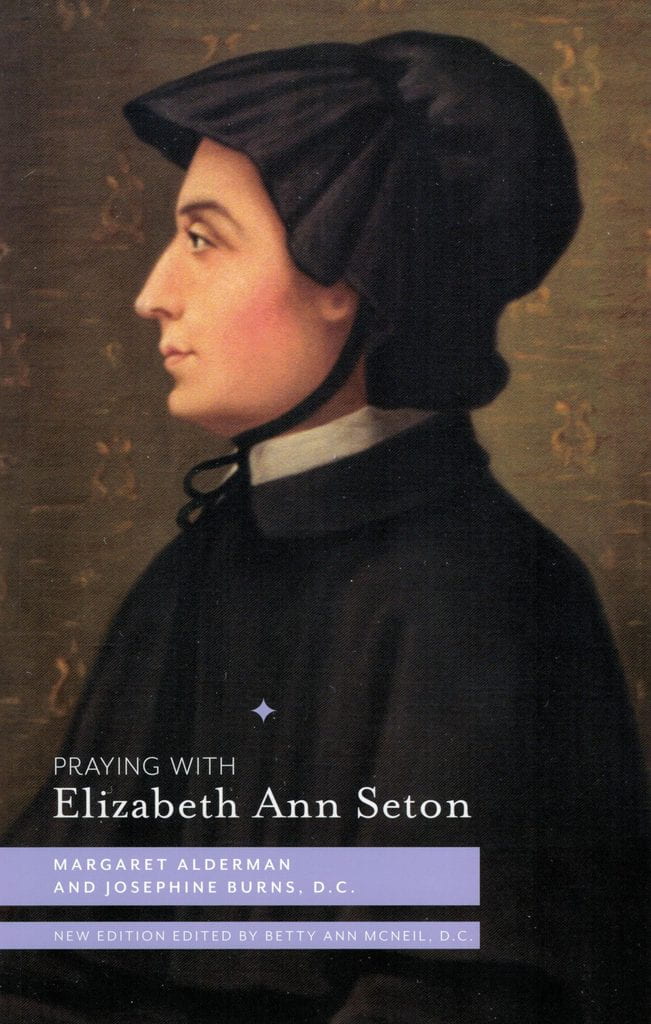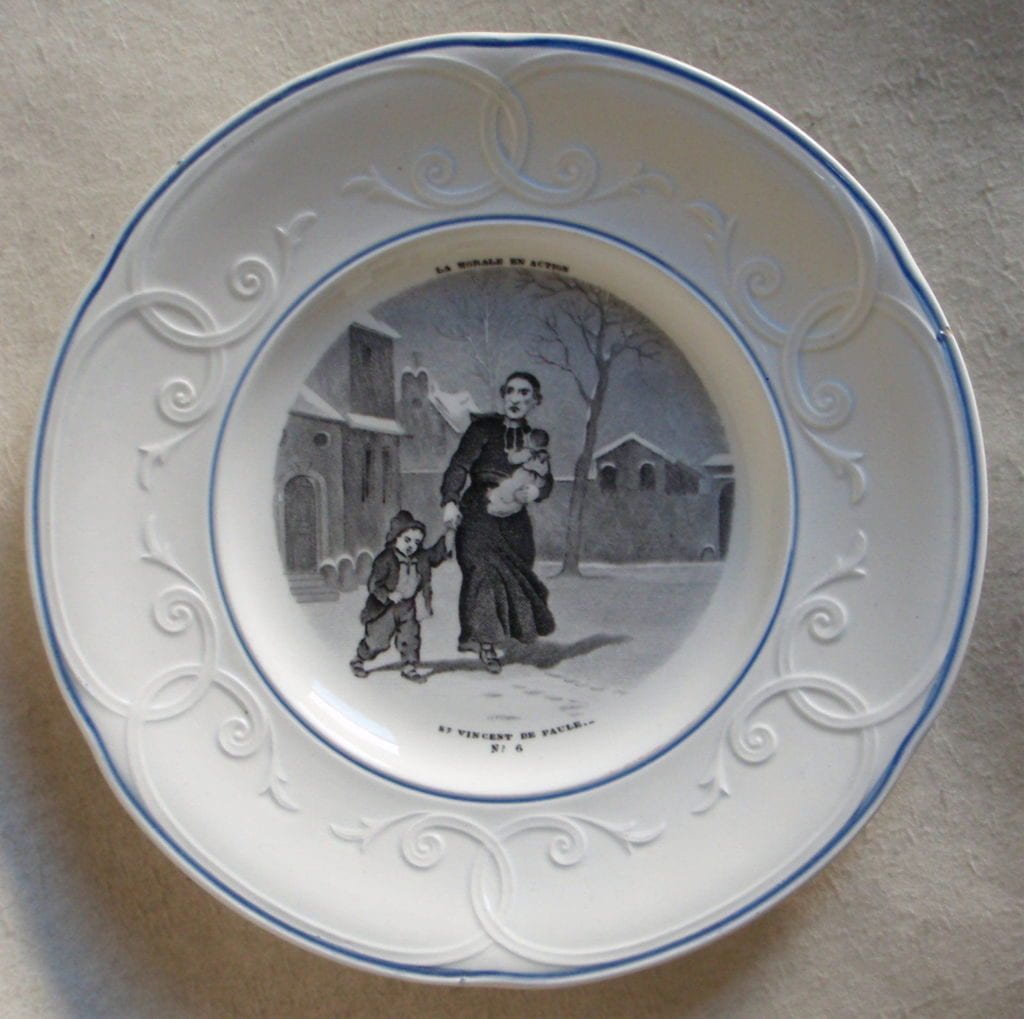Author: bcicirel
English-language Vincentian Annals now available online
DePaul University Library and DePaul’s Office of Mission and Values are proud to announce the digital publication of The Annals of the Congregation of the Mission: A Collection of Edifying Letters. Volumes may be viewed and downloaded for free athttp://via.library.depaul.edu/annals_en/.
The thirty-two volumes of The Annals (1894-1926) represent the English-language translation of those same years of Les Annales de la Congregation de la Mission, a French periodical published by the Congregation of the Misson via the Vincentian motherhouse in Paris. The letters, communiques, and updates included in each issue were meant to keep the community apprised of the activities of their confreres around the world.
Modeled by the Vincentians on Les Annales de la Propagation de la Foi (published by the Society of the Propagation of the Faith, a Catholic administrative body that oversees Church missionary activity), The Annals, while successful, proved to be too much translation work for the Vincentians (each volume running approximately 700 pages). Publication ended in 1926.
Available digitally for the first time in English, the information included in these thirty-two volumes is invaluable in understanding the Vincentian community and Catholic missionary work during the late-19th and early-20th centuries. The lives and deeds of countless Vincentian priests and Daughters of Charity are detailed. Moreover, the volumes contain eyewitness accounts of missionaries, chaplains, and battlefield nurses who experienced conflicts including the First Sino-Japanese War, the Philippine Revolution and Spanish-American War, the Boxer Rebellion, the Mexican Revolution, and most importantly World War I.
Volumes are in the process of being digitized and made available online by DePaul University Library, where the volumes reside as part of the Vincentian Studies Collection.
This project began in 2016, with the first eight volumes (one quarter of the print run) currently available. The next eight volumes will be available in early 2018, and so on. The digitization of all thirty-two volumes of The Annals is due to be completed in 2020.
For more information about this project, The Annals, DePaul’s Vincentian Studies Collection, or the Vincentian family, please contact DePaul’s Vincentian Librarian, Andrew Rea, at area1@depaul.edu.
Charity is a Verb
The Vincentian Question, “What Shall Be Done?” is framed in such a way that its answer implies action. When offering guidance on Charity to his confreres, the Daughters, the Confraternities, and to us, Vincent is clear: “Love of God and of neighbor is authenticated in visible action.” Charity is the true characteristic of the Love of God; it cannot remain idle. In fact, a life dedicated to Charity demands fearless, unending work involving the “sweat of our brows and the expense of our arms.
“Charity is a Verb” is a chapter from the book Windows on His Vision (pp. 127-128) available at: https://via library.depaul.edu/windows/2/
It is also available as an ebook here: https://via.library.depaul.edu/vincentian_ebooks/8/
Angels with a Cause
This was a project Bluelight film created by the Digital Cinema department.
Filmed in LA over spring break.
This film documents the largest privately funded Meals on Wheels program in country.
Humility the Sure Foundation
For Vincent de Paul, the virtue of Humility served as a foundational one without which we have nothing. It requires us to avoid self-aggrandizement, self-advancement, and seeking the praise of others. At the same time, however, it encourages our recognition of the gifts we have been given so long as we remember that we bear these gifts so that God may use them for God’s own purposes. Vincent counsels superiors in his community to be models of humility in dealing with those subject to their authority.
“Humility, the Sure Foundation” is a chapter from the book Windows on His Vision (pp. 131-132) available at: https://via.library.depaul.edu/windows/2/
It is also available as an ebook here: https://via.library.depaul.edu/vincentian_ebooks/8/
Who do you Know?
By Katie Hoffman
Who do you know?
It is interesting to sit back and think about all of the people we know… do you ever think about your backgrounds and how that has perhaps defined some of the interactions you’ve had with that person? It’s intriguing to ponder how cultures can change and even enhance some of our relationships and allow us to be more altruistic.
For me, I think about my living situations through my time at DePaul; each year sharing a home with someone of another faith tradition. My freshman year I lived alone and then with a friend of mine who happens to be Muslim and through our conversations it was easy to note how similar she and I are. My sophomore year, I shared an apartment with a very good friend of mine who is a non-practicing Lutheran and hence, religion and culture affected by religion were not large parts of our relationship but we were still able to share values. Junior year I was lucky enough to live in the Vincent and Louise House–this perhaps was the most rewarding and challenging living situation, especially being the only Jew in a house with seven Catholics, a baptist and a non-denominational Christian. It was a home in which ideals were always challenged; but with love and the hopes of understanding.
Now, as a senior I share an apartment with another Jewish girl and a good friend of mine. One would think it would be a lot easier when considering culture, however it is quite the contrary. However, through our discussions it has allowed my eyes to be opened to truly how different one person may believe and practice their faith tradition and allowed this to be compared to my own experiences; this has made all the difference and has allowed me to appreciate Judaism so much more and it’s multifaceted approaches. This understanding I have begun to apply to learning about others and their cultures and I invite you to try to do the same.
Newsnote: Revised edition of “Praying with Elizabeth Ann Seton” is published by the V.S.I.
By Margaret Alderman and Josephine Burns, D.C.
New edition edited by Betty Ann McNeil, D.C.
As the first saint to grow from the soil of the United States, Elizabeth Ann Seton holds a special place in the story of the Catholic church in America. A wife and widow, mother of five children, founder of a new community of religious women, teacher and administrator, Elizabeth was remarkable by any standard. Most importantly, Elizabeth Seton was a holy person who companioned other people to a greater love of God and of their sisters and brothers.
Praise for Praying with Elizabeth Ann Seton:
Elizabeth Seton has great name recognition among many around the world. Some know the basic outline of her life, but few know with any depth the beauty and profundity of her spiritual life. Sister Betty Ann McNeil, D.C., has provided a great service by overseeing the revised republication of Praying with Elizabeth Ann Seton. It is one of the few books available that offer an in-depth look at important aspects of the saint’s spirituality. For those who use it to truly PRAY with Elizabeth Seton, it can be an opportunity, not only to appreciate Elizabeth’s spiritual journey, but to open the door to one’s own journey into a deeper relationship with God.
Sister Judith Metz, S.C.
Archivist and Historian
Sisters of Charity, Cincinnati, OH
117 pages
ISBN: 978-1-936696-10-9
Retail price: $16.99
Available from the Seton Shrine Book Shop:
https://setonshrine.org/product/praying-st-elizabeth-ann-seton/
The Many Faces of Vincent de Paul: 19th Century French Romanticism and the Sacred
Guest-curated by Rev. Edward R. Udovic, CM, PhD, as a companion to Four Saints in Three Acts, this special exhibition of 19th century sculptures, holy cards, textiles, decorative arts and prints from the university’s collection will explore how Romanticism impacted the iconographic representations of Saint Vincent de Paul (1581-1660), at the dawn of the modern era.
Newsnote: Vincentiana Purchase of the Week Early 19th century transferware plate of Saint Vincent
The Vincentiana Collection in Archives and Special Collections at DePaul University’s Richardson Library has recently acquired an early-19th century decorative transferware plate depicting Saint Vincent de Paul rescuing foundlings in the snow-covered streets. This types of decorative plates were very popular in bourgeois households. This plate is numbered “6” in a series entitled “Morale en action.” The idiosyncratic spelling of Vincent de Paule dates it from the first third of the 19th century. The Vincentiana collection has a number of these plates in its collection.
justice rooted in hope

As Vincentians at DePaul we look for hope, even in the hardest of times. In this poem, Vincentian Community Service Office staff person Emily LaHood-Olsen explores the call to a justice that is rooted in hope. This work was originally shared at VIA (Vincentians in Action) Big 8 on March 2.
I am tired.
Tired of reading headlines
that make me roll my eyes
or cry at the state of our world
where Black boys and girls
have to learn how to say,
“My hands are up! Don’t shoot.
I have nothing in my pockets that can harm you.”
I am disheartened.
Disheartened that immigrants
are granted no pardon
for seeking a life
where they can raise
their children without strife.
Disheartened and disillusioned
that refugees are left stranded
in lands where bombs leave contusions
in the earth.
And the earth.
I cry for the earth,
weep for the earth,
ask for forgiveness from the earth,
for the desertification
and greed of our nation.
As we watch fertile lands and forests burn,
Do we remember that we are dust,
and to dust we will return?
Where do we turn
to make meaning of the pain
the Trans community has to explain
day after day,
seeking a way
to feel comfortable in their own skin?
How can I say, “Come in!
Welcome to the table
all you who are alternately able
or housing and food unstable
or suffering from poverty,
those for whom a warm home is a novelty.”
How do I justify the blind eye
I turned to Syrians a week after
they recorded final goodbyes,
their city crumbling,
rubble tumbling,
rockets and grenades pummeling
through the safety and walls
they once called home?
What is home?
A place?
A space?
A body?
I look in the mirror
to make it clear
that my body,
my home,
my spirit have value.
Or, shall you tell me
that it’s a woman’s role to be small?
I am nauseated
that I relive and recall
my own sexual assault
every time I hear the words locker room talk.
What do I do?
What must be done?
How long until this battle is won?
Battle- that’s violent
but we must be strident
in peace
No shallow, complacent, or nicety show
The peace that we seek is one that must grow
from the pits of our bellies
and strength of our hearts,
from a people too strong to be torn apart
by the hate in this world
or the rhetoric curled
‘round the fingers of those who gain
from oppression
Oppression, repression, depression
Did I mention
how easy it is to feel paralyzed?
But we must rise
above the overwhelming din
of dehumanization and social sin.
So where do we turn for wisdom
in the face of systems
we can’t comprehend?
Is this the time to seek revenge
or to make amends with humanity
and bring validity and dignity to the lives
of those we love
and even to those we might despise?
Because at the core of it all is
relationship.
I must admit
It seem deceitful
to look at systems
without seeing people
Before we start dismantling,
let’s try planting
seeds of right relationship and healing,
for we are dealing
with systems that are made up of people
and people who are within themselves
complex systems.
If you want to change the system,
love the people.
Become a steeple,
A church of sanctuary
contrary to the discord
of every word
that buries hope
Hope in community
Hope in hard times
Home beyond rhymes
Hope incarnate, made flesh
Hope enmeshed in Ubuntu,
I am not free to be me
until you are free to be you
We struggle together
laugh together
create music and art together
and resist together
Insist together
that another world is possible



